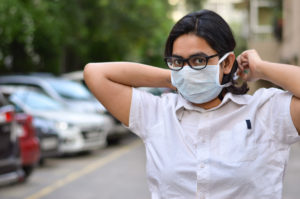Mechanical engineering expert available for interviews
TORONTO, Wednesday, Oct. 21, 2020 – Mechanical engineering expert available for interviews
As temperatures start to dip during the second wave of COVID-19, many people may be spending more time indoors. Both heating and humidity indoors can play a role in transmission of viruses but what does “airborne transmission” really mean and how can ventilation make a difference?
Marina Freire-Gormaly, assistant professor in the department of mechanical engineering at the Lassonde School of Engineering at York University, is available for interviews today. One of her current research projects looks at microdroplet transmission and its implications on HVAC design.
“We spend the majority of our time indoors during the winter. As we prepare our homes for winter, it is paramount that we consider how COVID can be transmitted by aerosols, and how to minimize the risk of infecting our family members, or colleagues if we catch COVID-19, or other infectious diseases,” says Freire-Gormaly. “One of the major challenges is maintaining good indoor air quality. HVAC systems are designed for maintaining fresh air in our buildings. There are some simple things you can do to improve the air quality in your home, from ensuring your fresh air intakes are open, to ensuring you are replacing your filters when they are dirty, and keeping your washroom ventilated to the outdoors.”

Freire-Gormaly can speak about the following:
- What does “airborne transmission” really mean?
- What are the best ways to isolate in small places like apartments etc.?
- How can heating in the colder months impact transmission of viruses, like COVID-19?
- Can air purifiers really make a difference in minimizing aerosol particles being transmitted between people?
- What is the value of opening windows, how much, how often to improve airflow?
- What is a fresh air ratio and why does it matter?
- Can COVID-19 be aerosolized by flushing the toilet?
- What is the role of filters, can they play a role in infections?
- Can COVID-19 be spread in your home?
York University champions new ways of thinking that drive teaching and research excellence. Our students receive the education they need to create big ideas that make an impact on the world. Meaningful and sometimes unexpected careers result from cross-disciplinary programming, innovative course design and diverse experiential learning opportunities. York students and graduates push limits, achieve goals and find solutions to the world’s most pressing social challenges, empowered by a strong community that opens minds. York U is an internationally recognized research university – our 11 faculties and 25 research centres have partnerships with 200+ leading universities worldwide. Located in Toronto, York is the third largest university in Canada, with a strong community of 53,000 students, 7,000 faculty and administrative staff, and more than 300,000 alumni. York U's fully bilingual Glendon Campus is home to Southern Ontario's Centre of Excellence for French Language and Bilingual Postsecondary Education.
Media Contact
Anjum Nayyar, York University Media Relations, cell 437-242-1547, anayyar@yorku.ca
